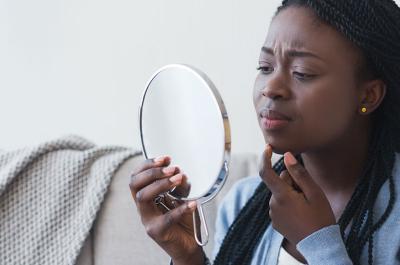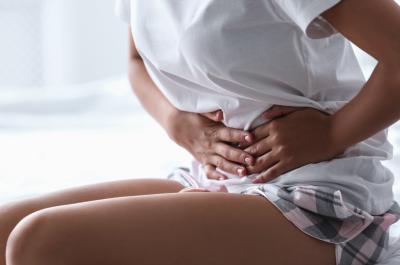What is spotting and why does it happen?

It’s normal to feel a twinge of worry if you see a few spots of unexpected blood in your underwear or on a piece of toilet paper. While it’s always important to see your doctor anytime you experience bleeding outside the expected window of your period, know that you’re not alone. Spotting can occur for many different reasons. Let’s take a closer look.
What is spotting?
If you’ve ever experienced bleeding lighter than your period and it’s happened outside the time frame of your expected period, chances are you’ve called it spotting. This type of bleeding is also referred to as abnormal uterine bleeding.1
What does spotting look like?
The term “spotting” is fitting because that’s what it looks like: spots of pink or red on your underwear, pad, toilet paper or in the toilet. Spotting is lighter than the bleeding you typically experience during a period. If you experience premenstrual syndrome (PMS) symptoms before your period, this can help you further differentiate spotting from the start of your period.
When does spotting occur?
Spotting can occur at any point during your cycle outside of your period. The timing of this spotting depends on why it’s happening; we dig into the details of each cause below. In general, you may experience spotting:
- During a transition in life: perimenopause, menopause2,3
- In the middle of your cycle: ovulation bleeding
- One to two weeks after conception: implantation bleeding5
- In early pregnancy: Always see a doctor if you experience bleeding during pregnancy.6
Spotting can also occur at times not linked to a transition in your life, your menstrual cycle, conception or pregnancy, such as:
- When you start, stop or switch birth control7
- When you have sex8
- If you have endometriosis,2 ovarian cysts,2 uterine fibroids9 or an STI10
If you suspect spotting is related to any of these factors, talk to your doctor.
Causes of spotting
Spotting can occur for several reasons, so it’s important to see your doctor if you experience it. They will help you narrow down the cause specific to your symptoms. In the meantime, here are some possible causes:
Causes related to reproductive health
- Taking hormonal birth control: Spotting, sometimes called breakthrough bleeding, can occur when you start, stop or switch certain types of hormonal birth control.1,7 According to The American College of Obstetricians and Gynecologists (ACOG), spotting is more common if you’re using low-dose birth control pills, implants and hormonal IUDs.7 You’re also more likely to experience spotting while on birth control if you smoke, don’t take your pills regularly and/or if you take your pills continuously to skip your period.7
- Having sex: According to a study published in 2022 in The Obstetrician & Gynaecologist, up to 9% of women experience bleeding after sex.11 Spotting after sex could be the result of vaginal dryness or cervix inflammation.8 If this bleeding becomes regular, talk to your healthcare provider.
- Ovulation bleeding: A small percentage of people experience spotting around the time they ovulate.4
- STIs: Sexually transmitted infections, such as chlamydia and gonorrhea, can cause spotting between periods.10 If you think you may have an STI, reach out to your healthcare provider.
Causes related to pregnancy
- Implantation bleeding : If a fertilized egg implants in the lining of your womb (resulting in pregnancy), you may notice some spotting around the time your period is due.5 Implantation bleeding lasts about one to two days, is light in color and may come with some light cramping.5 If you think you may be pregnant, take a pregnancy test and reach out to your doctor.
- Early pregnancy: According to ACOG, spotting occurs in 15 to 25 out of every 100 pregnancies, possibly because more blood vessels are developing, causing the cervix to bleed more easily.6 Spotting during early pregnancy can also occur after sex and pelvic exams.6
- Ectopic pregnancy: An ectopic pregnancy is serious and requires immediate medical attention. According to ACOG, sometimes the only symptom is vaginal bleeding. Other symptoms include pelvic, abdominal or shoulder pain.6
Causes related to life transitions
- Perimenopause or menopause: During perimenopause, your period may change, becoming either lighter or heavier.3 However, spotting or bleeding that occurs outside your period, after sex or after menopause is not normal.3 If you notice it happening, contact your doctor.
Causes related to health issues
- Primary ovarian insufficiency (POI): Spotting between periods is a symptom of POI, which is when a person goes through menopause earlier than expected.12
- Endometriosis : This is a common, often painful condition in which the tissue that lines the uterus grows outside the uterus.2,13 Endometriosis has many symptoms, including spotting or bleeding between periods.2,13
- Other possible causes: These can include ovarian cysts,2 uterine fibroids9 and cancer.1,2
If you experience spotting and have any concerns, reach out to your doctor.
Is spotting normal?
Spotting can occur for many reasons; some are more serious than others. However, it’s important to see your doctor to get to the root cause. Depending on the reason, you may need to seek medical treatment. See your doctor if:
- You’re bleeding anytime in your cycle other than during your period2
- You’ve bled after sex more than once2
- You’re pregnant or think you could be6
- You’re spotting and postmenopausal2
Before you visit your doctor, it may be helpful to put together a detailed personal health history, as spotting can be caused by many different things.1 Gathering information about your family health history is also wise.1 Bring a list of all the medications you’re taking (including birth control).1 And if you have time, try to track when your spotting occurs, noting what it looks like and how long it lasts, up until your appointment.1
Related Articles
Sources
- The American College of Obstetricians and Gynecologists. Abnormal uterine bleeding. Updated December 2021. Accessed March 6, 2023.https://www.acog.org/womens-health/faqs/abnormal-uterine-bleeding?
- Office on Women’s Health, U.S. Department of Health & Human Services. Period problems. Updated February 22, 2021. Accessed March 6, 2023. https://www.womenshealth.gov/menstrual-cycle/period-problems
- The American College of Obstetricians and Gynecologists. Perimenopausal bleeding and bleeding after menopause. Updated August 2022. Accessed March 6, 2023. https://www.acog.org/womens-health/faqs/perimenopausal-bleeding-and-bleeding-after-menopause
- Cleveland Clinic. Ovulation. Updated July 8, 2022. Accessed March 6, 2023. https://my.clevelandclinic.org/health/articles/23439-ovulation
- Cleveland Clinic. Implantation bleeding. Updated December 16, 2022. Accessed March 6, 2023.https://my.clevelandclinic.org/health/symptoms/24536-implantation-bleeding
- The American College of Obstetricians and Gynecologists. Bleeding during pregnancy. Updated August 2022. Accessed March 6, 2023. https://www.acog.org/womens-health/faqs/bleeding-during-pregnancy
- The American College of Obstetricians and Gynecologists. What you should know about breakthrough bleeding with birth control. Updated January 2021. Accessed March 6, 2023. https://www.acog.org/womens-health/experts-and-stories/the-latest/what-you-should-know-about-breakthrough-bleeding-with-birth-control
- Cleveland Clinic. Bleeding after sex: what you should know. Updated October 10, 2022. Accessed March 6, 2023. https://health.clevelandclinic.org/what-should-you-do-if-you-bleed-after-sex/
- The American College of Obstetricians and Gynecologists. Uterine fibroids. Updated July 2022. Accessed March 6, 2023. https://www.acog.org/womens-health/faqs/uterine-fibroids
- The American College of Obstetricians and Gynecologists. Chlamydia, gonorrhea, and syphilis. Updated January 2021. Accessed March 6, 2023.https://www.acog.org/womens-health/faqs/chlamydia-gonorrhea-and-syphilis
- Owens GL, Wood NL, Martin-Hirsch P. Investigation and management of postcoital bleeding. TOG. 2022;24:24-30. doi: 10.1111/tog.12780. Accessed March 6, 2023.https://obgyn.onlinelibrary.wiley.com/doi/epdf/10.1111/tog.12780
- Cleveland Clinic. Premature and early menopause. Updated September 6, 2022. Accessed March 6, 2023. https://my.clevelandclinic.org/health/diseases/21138-premature-and-early-menopause
- Office on Women’s Health, U.S. Department of Health & Human Services. Endometriosis. Updated February 22, 2021. Accessed May 15, 2023 https://www.womenshealth.gov/a-z-topics/endometriosis

All you need to know about your period
Even if you get your period every month, how much do you really know about periods?





